Recommended Stories
New York: Long thought to be a carbon sink, the world's tropical forests now release more carbon dioxide (CO2) in the atmosphere than they remove from it, thanks to their continued deforestation and degradation, warns a new study.
The study published in the journal Science, analysed the carbon density of woody live vegetation across tropical America, Africa and Asia for the period 2003 to 2014.
The researchers combined a comprehensive array of data, including carbon estimates from NASA, satellite imagery and field measurements.
The findings showed that carbon losses exceed gains on every continent, with the greatest losses, 60 per cent, occurring in the American tropics.
"The losses due to deforestation and degradation are actually emitting more CO2 to the atmosphere, compared with how much the existing forest is able to absorb," the lead author of the study Alessandro Baccini of Woods Hole Research Center in Massachusetts was quoted as saying by the Washington Post.
For the carbon loss that did occur, the majority was due to deforestation and degradation, particularly in tropical America and Africa, the study said.
The findings point to an urgent need to stop degradation of the world's tropical forests.
Remarkably, the authors found trends between local policies and carbon abundance.
For example in Brazil, decreasing losses in carbon density are evident during the early period of the study, which the authors attribute to retractions in soy and cattle production, increases in monitoring and enforcement together with fines and embargos on illegal deforestation, and the creation of new protected areas.













